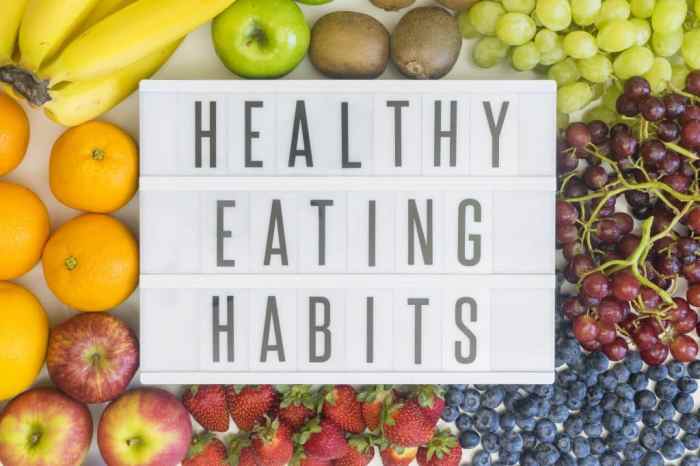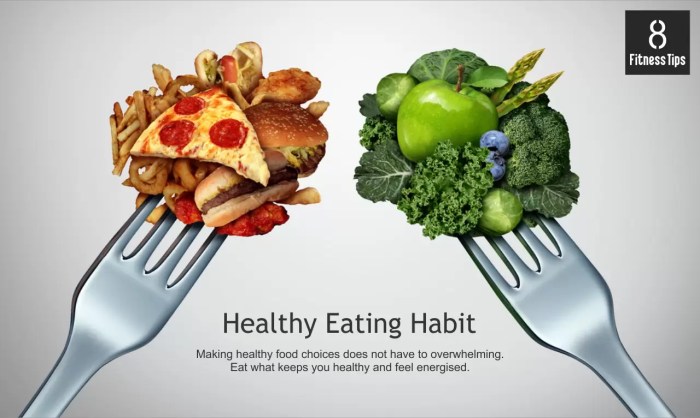Healthy Eating Habits are more than just a trend – they are a lifestyle choice that can revolutionize your overall well-being. Dive into the world of nutritious diets and discover the secrets to a healthier you.
From the importance of essential food groups to debunking common myths, this guide will equip you with the knowledge to make informed decisions about your diet.
Importance of Healthy Eating Habits

Eating right isn’t just a trend, it’s a lifestyle that can make a huge impact on your overall well-being. When you fuel your body with nutritious foods, you’re not just satisfying hunger, you’re giving your body the essential nutrients it needs to function at its best.
Benefits of Adopting a Nutritious Diet
- Improved Energy Levels: Eating a balanced diet can help boost your energy levels and keep you feeling alert throughout the day.
- Weight Management: A healthy diet can help you maintain a healthy weight and reduce the risk of obesity-related conditions.
- Stronger Immune System: Nutrient-rich foods can help strengthen your immune system, making you less susceptible to illnesses.
- Better Mood: Eating well-balanced meals can positively impact your mood and mental well-being.
Prevention of Various Health Conditions
- Heart Disease: A diet high in fruits, vegetables, whole grains, and lean proteins can lower the risk of heart disease.
- Diabetes: Maintaining a healthy weight through proper nutrition can help prevent the onset of type 2 diabetes.
- Cancer: Eating a variety of colorful fruits and vegetables can reduce the risk of certain types of cancer.
Components of a Healthy Diet
Eating a balanced diet is essential for maintaining good health and overall well-being. A healthy diet consists of a variety of foods that provide the necessary nutrients for our bodies to function properly.
Key Food Groups in a Balanced Diet
- Fruits: Fruits are rich in vitamins, minerals, and antioxidants that help boost our immune system and reduce the risk of chronic diseases.
- Vegetables: Vegetables are packed with essential nutrients like fiber, potassium, and folate that are important for digestion and overall health.
- Whole Grains: Whole grains provide fiber, B vitamins, and minerals that help regulate blood sugar levels and keep us feeling full and satisfied.
- Proteins: Proteins are essential for building and repairing tissues, making enzymes and hormones, and maintaining healthy muscles and bones.
- Dairy: Dairy products are a good source of calcium, vitamin D, and protein, which are important for bone health and overall growth and development.
Importance of Consuming Fruits and Vegetables Daily
Consuming fruits and vegetables daily is crucial for obtaining a wide range of essential vitamins and minerals that are vital for various bodily functions. They are also rich in fiber, which aids in digestion and helps prevent constipation. Additionally, fruits and vegetables are low in calories and high in antioxidants, making them ideal for weight management and reducing the risk of chronic diseases like heart disease and cancer.
Role of Proteins, Carbohydrates, and Fats in a Healthy Diet
Proteins play a crucial role in building and repairing tissues, supporting the immune system, and acting as enzymes and hormones in the body. Carbohydrates are the main source of energy for our bodies and are essential for fueling our brain and muscles. Fats are important for absorbing fat-soluble vitamins, providing essential fatty acids, and protecting our organs.
Tips for Developing Healthy Eating Habits
Developing healthy eating habits is essential for overall well-being. It’s not just about what you eat, but also how you plan your meals, incorporate whole foods, and practice mindful eating. Here are some tips to help you get started on your journey to a healthier lifestyle:
Meal Planning Strategies, Healthy Eating Habits
Planning your meals in advance can help you make healthier choices and avoid impulsive decisions. Here are some strategies to support healthy eating through meal planning:
- Set aside time each week to plan your meals and snacks.
- Make a grocery list based on your meal plan to ensure you have all the ingredients you need.
- Prepare meals in batches and store them in containers for easy access throughout the week.
- Include a variety of fruits, vegetables, whole grains, lean proteins, and healthy fats in your meal plan.
- Experiment with new recipes and flavors to keep your meals interesting and enjoyable.
Incorporating Whole Foods
Whole foods are nutrient-dense and provide essential vitamins, minerals, and antioxidants. Here are some ways to incorporate more whole foods into your daily meals:
- Choose whole grains like quinoa, brown rice, and oats over refined grains.
- Include a variety of colorful fruits and vegetables in your meals for a range of nutrients.
- Opt for lean proteins like chicken, fish, tofu, and legumes instead of processed meats.
- Snack on nuts, seeds, and Greek yogurt for a boost of protein and healthy fats.
- Avoid sugary beverages and opt for water, herbal tea, or infused water instead.
Mindful Eating Practices
Mindful eating involves paying attention to your food choices, eating slowly, and savoring each bite. This practice can help you tune into your body’s hunger and fullness cues, leading to better portion control and improved digestion. Here are some mindful eating practices and their impact on overall health:
- Avoid distractions while eating, such as watching TV or scrolling through your phone.
- Chew your food slowly and savor the flavors to enhance satisfaction and digestion.
- Listen to your body’s hunger and fullness signals to know when to start and stop eating.
- Be mindful of emotional eating triggers and find alternative ways to cope with stress or boredom.
- Practice gratitude for your food and the nourishment it provides to your body.
Common Misconceptions about Healthy Eating
When it comes to healthy eating, there are many myths and misconceptions that can lead people astray. It’s important to debunk these false beliefs to make informed choices about our diets.
Myth: Carbs are the Enemy
One common misconception is that carbohydrates are bad for you and should be avoided at all costs. In reality, carbs are an essential source of energy for our bodies, especially complex carbs found in whole grains, fruits, and vegetables.
Myth: All Fats are Unhealthy
Another myth is that all fats are harmful and should be eliminated from our diets. The truth is that healthy fats, such as those found in avocados, nuts, and olive oil, are actually beneficial for heart health and overall well-being.
Myth: Skipping Meals Helps with Weight Loss
Some people believe that skipping meals is an effective way to lose weight. However, this can actually slow down your metabolism and lead to overeating later on. It’s important to fuel your body with regular, balanced meals throughout the day.
Effects of Poor Eating Habits: Healthy Eating Habits

Eating an unhealthy diet can have serious consequences on our overall health and well-being. It can lead to various health risks and chronic diseases, impacting both our physical and mental health.
Health Risks Associated with a Poor Diet
- Poor nutrition can weaken the immune system, making us more susceptible to infections and illnesses.
- High intake of processed foods, sugar, and unhealthy fats can increase the risk of obesity, heart disease, and diabetes.
- Deficiency in essential nutrients like vitamins and minerals can lead to various health issues and deficiencies.
Impact on Mental Well-being
- Poor eating habits can affect our mood, energy levels, and cognitive function, leading to feelings of fatigue, irritability, and difficulty concentrating.
- A diet lacking in essential nutrients can also contribute to mental health disorders like depression and anxiety.
- Consuming excess sugar and processed foods has been linked to an increased risk of mood swings and mental health issues.
Link Between Diet and Chronic Diseases
- Unhealthy eating habits are closely linked to the development of chronic diseases such as obesity, diabetes, and heart disease.
- A diet high in saturated fats, sugar, and sodium can lead to weight gain, insulin resistance, and cardiovascular problems.
- Research shows that making positive changes to our diet, such as increasing fruit and vegetable intake and reducing processed foods, can help prevent and manage chronic diseases.

